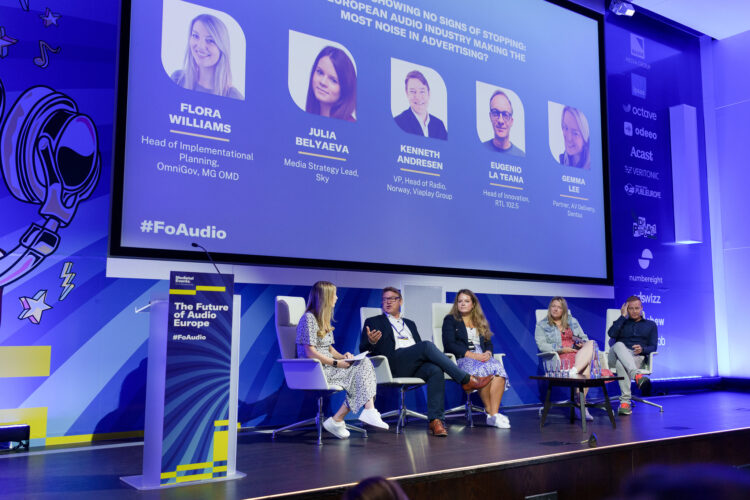Audio companies must “come together” to stop Big Tech acting as gatekeepers between them and their audiences as users consume more radio and podcasts on smart speakers.
That was the warning from Kenneth Andresen, VP, head of radio, Norway at Viaplay Group, who told Mediatel’s Future of Audio Europe conference in London that collaboration is now the most important issues facing European broadcasters.
Andresen’s intervention came during a panel discussing what is next as listenership grows across Europe on digital formats, including on smart speaker devices built by Amazon, Apple and Google. In the UK, MPs have backed calls for legislation to be introduced to guarantee access to UK radio stations on such devices.
Eugenio La Teana, head of innovation at Radiovisione RTL 102.5, made an impassioned plea for the industry to come together and support Radioplayer, the not-for-profit platform and device agnostic radio technology platform.

“There is something that we are doing altogether, Europe and worldwide, which is Radioplayer,” said La Teana (pictured on right, above). “The point is that we are talking about experience. And some objects that we use, like a car, have become devices. So internally, in the dashboard, between the volume controls, will be a screen with an experience. … [With Radioplayer] we are trying to create a new experience that will be a common experience for the radio of the future.”
Andresen, also a strong supporter of Radioplayer, stressed the urgency for industry collaboration: “This is maybe the most important topic for European broadcasters and broadcasters everywhere. I wholeheartedly support Radioplayer because we are in a situation where big tech companies — at least some of them — are trying to be the gatekeepers between the broadcasters and the audience.
“I think we still have [an opportunity to do something], but the only way we will do that as broadcasters is if we come together.”
What’s behind Europe’s audio boom and what’s next?
Flora Williams, head of implementation planning at Omnicom Media Group’s OmniGOV (a bespoke agency that plans the UK Government’s use of media for ads), informed the panel that last year saw a 34% increase in digital audio ad spend, an 8.4% year-on-year increase in radio spend, and 2022’s forecasts estimate 25% growth for online audio and 4% for radio.
Meanwhile, Andresen believes the rising tide of new formats has lifted radio with it.
“It’s surprising. I don’t think radio has changed overnight,” he commented. “At its core it’s the same thing that we have been doing all the time. It’s great companionship, it’s music, it’s news, it’s entertainment. But the thing that has happened — and I think the thing that really drove the growth, at least in the Nordics — is podcasting made radio and audio sexy again.”
Gemma Lee, partner of AV delivery at Dentsu, sees radio as a firmly established force in the UK’s media landscape: “I think radio’s always been booming in the UK … it’s still the bread and butter. I’m a massive radio listener, I listen to Radio X all day, and I listen to it through an Alexa. So, from a buying point of view, I’m consuming digital audio; from my point of view, I’m consuming traditional linear radio.
“I think that podcasting is great, it’s growing, and getting people who don’t usually listen to commercial radio in the UK, but radio’s always been booming here. RAJAR after RAJAR, we just see consistently strong figures and consistently decent ROI for clients as well.”
Digitisation key to continued growth
When discussing how Europe’s audio industry can capitalise on its ongoing growth, Andresen pointed towards the need for rapid digitisation: “Linear radio, when it goes to IP, that is the most exciting thing happening to radio in many years, and I think radio, as an industry, has been really lagging behind on the digital part.
“But of course it’s dependent on moving to IP platforms. And that is something, at least in most markets, that is taking some time, so at the moment that’s a limited space. But for sure, targeted ads, personalised ads into IP streams, that’s the way forward for a lot of radio ads.”

Julia Belyaeva, media strategy lead at Sky (pictured, above), also saw strong potential for targeting on digital audio: “We can now target based on highly contextual information, whether that’s based on weather, or the time of day, or what music people are selecting, their mood and their personal preferences.
“We’ve worked with some partners like [WPP programmatic specialist] Xaxis to integrate our own audience segmentation based on behavioural attitudes to things like TV, broadband, and mobile, to home in and target customers to upgrade. There are really specific messages going out to those audiences.”
Adwanted UK are the audio experts at the centre of audio trading, distribution, and analytics. We operate J‑ET - the UK’s trading and accountability system for both linear and digital radio. We also created Audiotrack, the country’s premier commercial audio distribution platform, and AudioLab, the single-point, multi‑platform digital audio reporting solution delivering real‑time insight.
To scale up your audio strategy,
contact us today.







